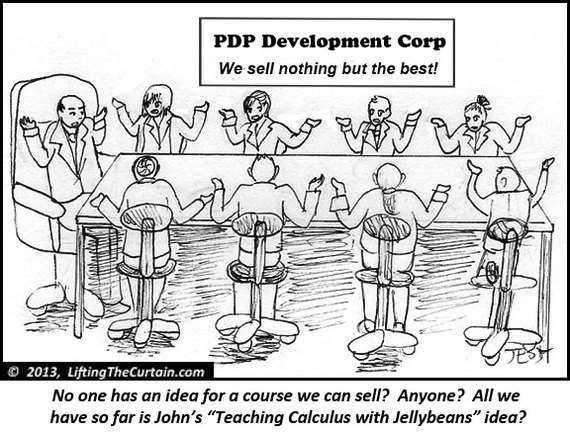PDPs - Professional Development Plans (usually referred to as Professional Development Points by teachers) - are the primary means of giving teachers needed training during their careers. All teachers are required to take additional training, and be credited with PDPs in order to be re-certified to teach. All schools conduct internal training programs that award some of the required PDPs periodically, but in addition teachers must find outside sources of training that qualify for most of their PDP credits.
PDPs could be a good thing for teachers and education. After all, there are a number of topics that would be valuable for all teachers that are too rarely covered, such as: diversified learning, "explaining" versus "presenting," class discipline, evolving technology, and engaging students. But once again the Career DoE bureaucrats have taken a good goal, and twisted it into a costly, ineffective farce via their mismanaged implementation.
The problem is that there is a mandated need for so many PDPs (else they lose their license and jobs) that teachers have to scramble to take whatever credit-offering courses they can find. But there are a limited number of useful courses available, and only part of them provided by the schools. There are always topics required by state DOEs that qualify for PDP credits - such as training for standardized test proctoring, or annual review of restraint training. In addition, most schools carefully choose new topics relevant to their school each year. But these programs typically cover no more than one-fourth to one-third of the PDPs required to renew a teaching license. So a cottage industry has now grown into a major industry to churn out new "content" every few months that can be sold to teachers and schools to meet PDP requirements.
The result is exactly what you would expect - the drive in the PDP industry is to create something new and salable - not necessarily anything that helps education.
Teachers are mandated to find PDPs, so the PDP industry gets to work and invents new "content" to sell. In recent years, much of this new content has either been "check-the-box" training that is nothing more than a rehash of old material and will be ignored by the attendees, or it is a new fad-du-jour that someone cooked up to sell a course regardless of educational merit. Teachers routinely sit at these PDP conferences with a "...wink, wink, nod, nod, this is really useful..." view of the meeting. Everyone attending knows it is a costly, time-consuming farce. The goal is to get through the meeting, get the certificate that awards the mandated PDPs, and then go home and forget all the nonsense you just heard.
For extended versions of this and other of D. A. Russell's blogs about
the real issues in today's education system, please visit: https://liftingthecurtainoneducation.wordpress.com/
Now clearly, not all PDP conferences and classes are bad. But I can only recall a handful in the past decade that had nuggets a good teacher could use. One of the best half-day PDP sessions I ever attended was about ways to discipline with humor and engage today's child centered on an excellent book by Barkley. Another was a course with practical tips on diversified learning strategies.
Most of the other commercial PDP courses were a complete waste of time.
Example: The Power of "I"
A now-dead fad called "The Power of I" is the poster child for the ills of the PDP system. Thousands of schools across the country jumped on this program a few years ago to fill a half-day of PDP training, and yield a few precious PDP credits for their teachers. The program was a huge financial success for its developers. On the surface it was a program designed to help get students to do more homework. In reality, it was a program designed by someone who had absolutely no idea what teachers face in the classroom, and appears to know absolutely nothing about the psychology and expectations of a child.
The basis for "The Power of I" was: never give a child a zero for a missed assignment, instead give them an "I" for "Incomplete." By some mysterious process this would incent the child to finish the project at a later date. Somehow in the rush to create saleable PDP content, the creator believed he could convince experienced teachers that this was an effective way to get students to do more homework.
Many of us watched with trepidation as several of the newer teachers gave "The Power of I" a try. We watched as the term ended and the homework still had not been made up. We watched as the teacher asked in bewilderment what grade should be submitted for the end of the term report card if a student still had an "I" for three scores, and refused to make up the assignments. It was frustrating and sad to witness the hard lesson the new teacher learned about educational PDP fads, when the students did exactly what the experienced teachers expected. The student preferred the "I" to the zero because it let them safely skip the work, yet kept them out of trouble at home for weeks by hiding the zeroes. They gladly accepted the zero at the end of the term rather than make up the work - knowing they could use the excuse at home that it was too late, and they would just have one "punishment" all at once rather than having had to face the parent for each zero along the way.
Worst of all, by labeling failure with the relatively nice term of "incomplete," we enable the child to duck his/her responsibility. The child knows he/she simply blew off the assignment, but the school tells them it's okay because it is just "incomplete." The school has made it official - skipping assignments is okay.
It doesn't have to be this way!
There are many more like the "Power of I" that could be cited to make the point about useless PDP content. If I had to try to put numbers on my years of PDP training history, I would guesstimate the following:
Useful PDP content:20%
Rehash of old, known material:50%
Useless fad content:30%
But PDPs could be good for teachers and education if we just reduced the number required (so that there was no longer the need to purchase useless filler training) and follow training best practices. For any training program to succeed, any world-class trainer will tell you it must meet three criteria:
•Focused on the needs of the individual
•Focused upon the needs of the job
•Provide added value specific to the individual
The overall PDP program fails these criteria for the bulk of the PDP training that is available. Much of the training is just a repeat of prior years where 90% of the audience has been through the same presentation a dozen times before.
KIRKUS and CLARION both praise the acclaimed book "...from the unique perspective of a classroom teacher" about our failing education system:
Lifting the Curtain: The disgrace we call urban high school education.
The 2nd edition includes dozens of teacher submissions from across the USA and nine
new chapters. Please get a copy HERE or on Amazon.

